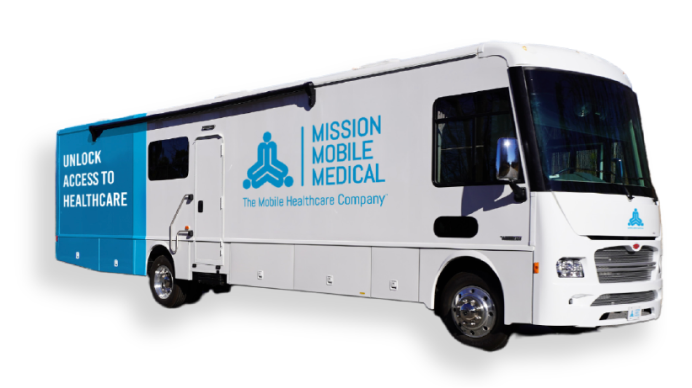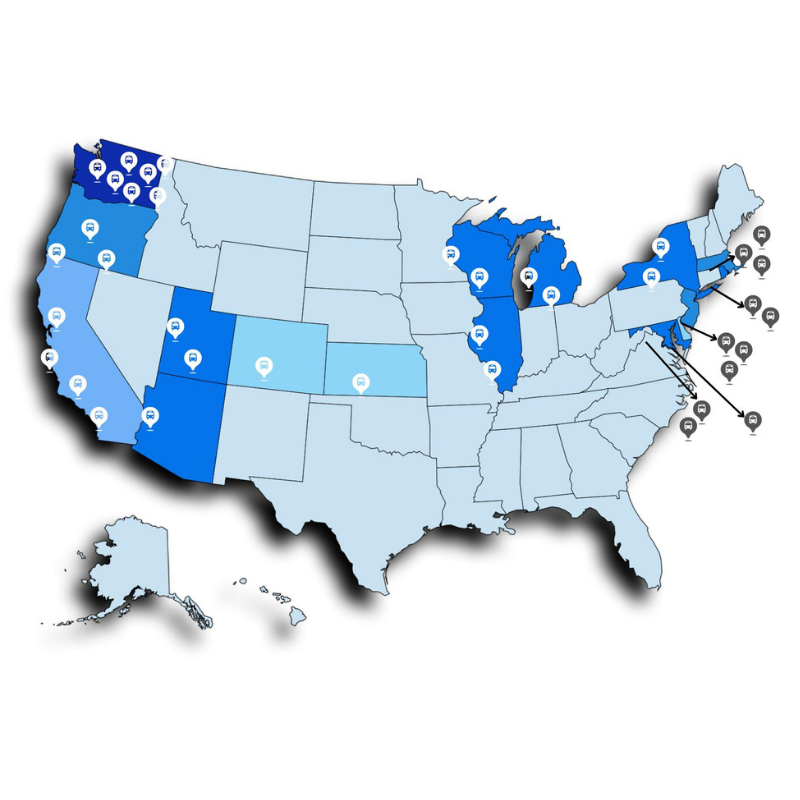Mission Mobile
Medication Clinics

Increase the reach of treatment
More admissions.
More stabilization.
More lives saved.
Single Dispensing
or Dual Dispensing
60-second
setup
DEA approved
for safety & security
Fully configurable
to ADA or Dual
Dental
Lab space plus
the industry's largest
storage areas
Full Bathroom
with sink, toilet, and
hot-water disconnect

It's a privilege.
It's a great privilege to walk alongside health providers like you and help increase access to care and improve health equity for under-served populations, especially those who need treatment related to substance use.
All of us are honored and humbled to support health centers who provide needed substance use disorder care. It's a crisis. And Mobile Treatment Clinics bring options to people who would might never seek or receive treatment due to barriers such as transportation, lack of insurance, or the stigma associated with care. You are giving people their lives back.
Whether it's lifesaving medication, counseling services, education, or simply connecting people in ned to essential services, we're with you.
Jacqueline Gerchman
Director of Addiction Services
Mission Mobile Medical:
Riding beside you, on the roads to recovery

Your Journey Towards On-site Treatment
- Average 89 days from deposit to delivery
- Counseling/Exam/Medication spaces
- DEA Approved Floorplans
- Includes properly installed Safe
- Approved Security Systems, integrated with your current secruity provider
- Fully configurable to ADA
- Full Bathroom with sink, toilet, and hot-water disconnect
- Wifi mesh network with GPS tracking
- Premium finishes (not cheap industrial)
DEA Approval
The TL;DR
DEA fully supports mobile OTP clinics and has approved 33 since late 2021. Our team has built most of them. Our design was the first US MAT clinic approved under the updated security regs, and our team participated fully in that program design and launch. We know this space.
Security is the mountain to climb - DEA believes mobile clinics should have security equal to brick-and-mortar OTP’s; approved safe, alarms, video-recording capability in the dispensing room, self-closing door hinges, and more. All of these requirements stem from the original 1970 security regulations.
In every case, in alignment with DEA protocol, all clinics (including mobile) must be approved by your local DEA Diversion Investigator.
Final security requirements will vary by location.

Sail with the Wind
DEA regulations have always emphasized the importance of maintaining robust security measures to prevent the theft and diversion of controlled substances (e.g., 21 CFR 1301.71(a)). This requirement applies equally to mobile NTPs and their components. You want to work with a team who not only understands requirements, but has experience, expertise, and established relationships with regulators to support approval and start-up.
Additional Requirements
In certain situations, mobile NTPs may require extra security measures that go beyond the specific requirements set by DEA regulations in order to effectively safeguard against theft or diversion of controlled substances. Considering that the necessity for such measures is dependent on individual circumstances, the DEA has not included them in the final rule. Instead, local DEA personnel, NTPs themselves, and relevant laws and regulations are trusted to determine if any additional measures are necessary.
Security
In considering the safety of the mobile component while it is away from its registered location, the DEA understands that the decision on whether to utilize security personnel is a complex one. There are numerous factors that should be carefully considered in making this determination.
Parking
21 CFR 1301.72(e) stipulates that the mobile component must return to the registered location daily. The DEA understands that not all NTP locations may have sufficient space to accommodate overnight parking for the mobile clinic. Therefore, it is typically acceptable to park the mobile clinic in a secure fenced-in location.
Staff Safety
For similar reasons, the DEA defers the decision regarding safety measures to the NTP and relevant government bodies outside of the DEA to ensure the well-being of the mobile component's staff and patients. Various factors such as location, number of patients, and cost will influence the NTP's choice in determining the safety measures that will best protect the patients and staff.
Licensing
In addition to DEA requirements, there are various other Federal, State, local, and tribal laws that these NTPs must consider when making their decisions. Therefore, because the appropriate protocols for a mobile NTP will differ based on circumstances and legal requirements, DEA will not attempt to specify additional requirements for NTPs as part of this rule. Email us to ask for our free resource document: Mission Mobile NTP Licensing Requirements.
Although DEA regulations broadly articulate basic security requirements, they cannot account for all security situations. Some situations may require additional security measures for a mobile NTP to be able to adequately guard against loss through theft or other forms of diversion.
Attempting to account for all such scenarios in advance through regulation is ineffective and may impose unnecessary restrictions on other mobile NTPs. DEA states they can best ensure that mobile NTPs provide adequate security by enabling local DEA offices (Diversion Investigators and SOTAs) to conduct case-by case evaluations as appropriate.
Although mobile NTPs present unique challenges, our team is confident we can support your mission, and the DEA is confident their team can work with our mobile NTPs to ensure that they operate securely.
.png?width=1744&height=1126&name=Mission%20Mobile%20Medical%20The%20Mobile%20Healthcare%20Company%20Logo%204%20(1).png)
